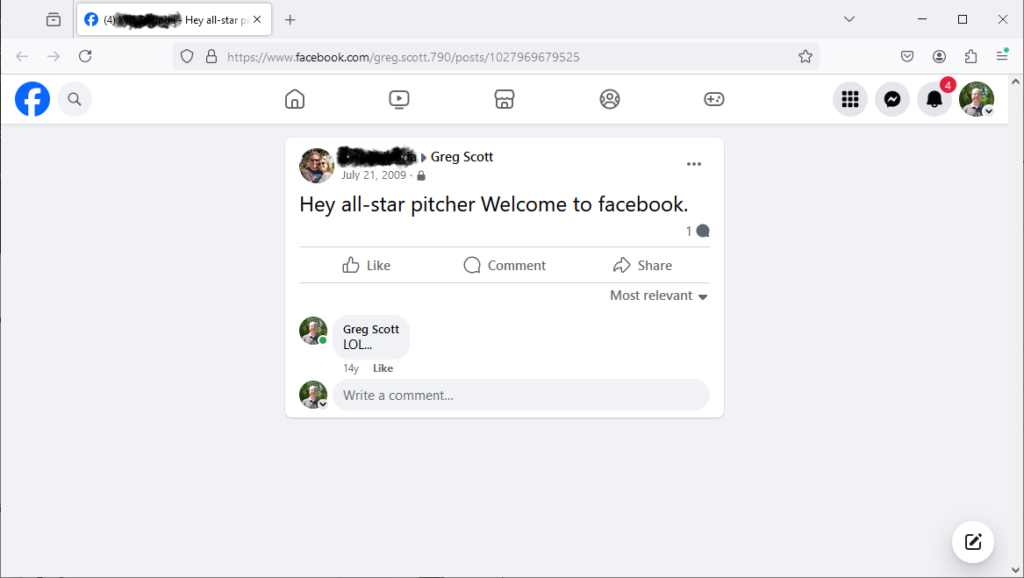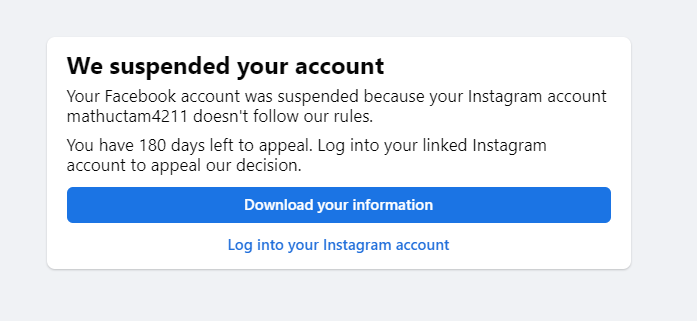
I started using Facebook back in 2009. A few friends greeted me. It was fun. I connected with my sister, T, and her family in Idaho and we’ve traded hundreds, or maybe thousands of messages since then. T was 11 when I was born. She spent much of her teenage years babysitting me.
In September, 2022, another sister I had never met, C, reached out to me. I found out she had been searching for me since the 1970s. And then I found out I have another sister, K, and a brother, E. Our mother put them up for adoption in the 1940s and 1950s.
We would have never connected without Facebook.
I’ve also seen the complaints about big tech political bias. I’ve written plenty of blog posts about social media and information warfare. But I accept the risk because I’m the poster child for connecting with friends and family via Facebook. Especially family I never knew existed until recently. For me, Facebook offers more good than bad.
But then stories like Alice’s come my way. Alice is not her real name. Alice and Bob are the most famous people in the cybersecurity community, especially Alice, because it’s just easier to visualize Alice than somebody named “Person A.” I’ll use female pronouns because Alice is a female name.
Alice contacted me a few days ago and told me she woke up one morning to this message from Facebook.

She had never heard of the offending Instagram account, but it was associated with an old email address she had forgotten about. Her business page was still good. But she couldn’t touch it without her personal page. She had planned several posts over the next few months to that business page, targeted to years of accumulated Facebook contacts.
But too bad, so sad. Ten+ years of family memories, posts, comments, and contacts, poof, all gone.
Naturally, she tried to contact Facebook. But anyone who has tried to contact Facebook knows that Facebook support makes the worst government bureaucracy horror stories look like models of responsive efficiency. Facebook “help” links send people around a circle to nowhere. Emails to published support email addresses mostly disappear into black holes.
And then it got worse. Somebody had been stalking Alice’s family over the internet. Could this clown have somehow gotten inside their devices and set all this up? Alice remembered reading a phone message claiming to come from Microsoft a few days earlier. She had deleted the message and didn’t remember details. Could it have been related? Could somebody have cloned her T-Mobile phone and done this? Was somebody threatening her family?
She visited her local police station and found out the police in her corner of America are closed on Fridays. She visited her local T-Mobile store and talked to the lone employee in the store, who knew nothing about how cell phones work, offered nothing useful, and wanted to quit her job.
This story sounded too outlandish. We were missing something.
Then I found this Reddit thread. And this one. This technology industry magazine article summarized the Reddit threads. So did this technology blog post. It seems thousands of Facebook users have seen this problem since mid 2023. Suddenly and without warning, poof, their Facebook profiles are gone. All that’s left is a message that an Instagram account with random letters and numbers did something Facebook didn’t like.
The good news: Alice is not alone. The bad news: this looks like a Facebook bug, around fourteen months old as of this writing, and Meta, Facebook’s parent company, doesn’t seem interested in fixing it. And so, every day, more problem reports pour into different social media threads, because Facebook has no incentive to respond to people who try to use Facebook channels to report bugs.
Solutions come down to two possibilities. Neither seem 100 percent effective.
- Create a paid Instagram account with the ability to report problems, and report the problem through that mechanism.
- If you’re in the US, write to your state Attorney General and the California Attorney General because Meta’s headquarters is in California. Outside the US, just write to the California Attorney General.
The world needs to know about this problem. And Facebook and other social media companies need to invest more into responding to bug reports. I know we’re not social media customers; we’re raw material. But if Facebook continues destroying its users’ profiles, than we might decide Facebook is not worth the trouble to recreate them. If enough raw material walks away, then advertisers and revenue will follow.
Many of the problem reports mention an Instagram profile linked to a Facebook profile. Even though the Instagram profile Facebook doesn’t like is different than the linked profile, I have a hunch this problem is somehow related to linking Facebook and Instagram profiles.
Until Facebook offers useful guidance, I’ll offer some cybersecurity safety tips.
- Do not use Facebook or any social media platform as the only source for your best content. Keep your good stuff somewhere you control, such as your website.
- Do not link your Instagram and Facebook accounts.
- Do not share social media login credentials with any other apps or people.
- Use unique passwords with each of your social media platforms.
- If any website offers to authenticate you with your social media credentials, say no. And mean it.
- Never never never tell your web browser to remember your credentials to anything. Never. If an attacker compromises your device, the the attacker knows everything your device knows about, including all those stored credentials.
One final tip. Package your message into something coherent and then make noise. Call local radio, TV, and print media and complain. Grab Facebook’s attention. Or if this blog post matches your problem, forward it widely. Hey, I’m not to proud to ask.
If Alice gets a resolution, I’ll update this blog post with it. Watch this space.
Facebook saga update, two days later
I showed Alice the information in the threads and articles linked above, and Alice used every available channel to contact Meta. Meta assigned case numbers, and then managers – or maybe AI chatbots impersonating managers – responded by closing her cases claiming they could not help her. One response said she violated Facebook’s rules and so they got rid of her profile to make the platform more enjoyable for users. I can only imagine Alice’s outrage.
And then a friend of a friend who works at Facebook put Alice’s profile back the way it was. Alice’s friends said they’re glad to see her back.

Recent Comments